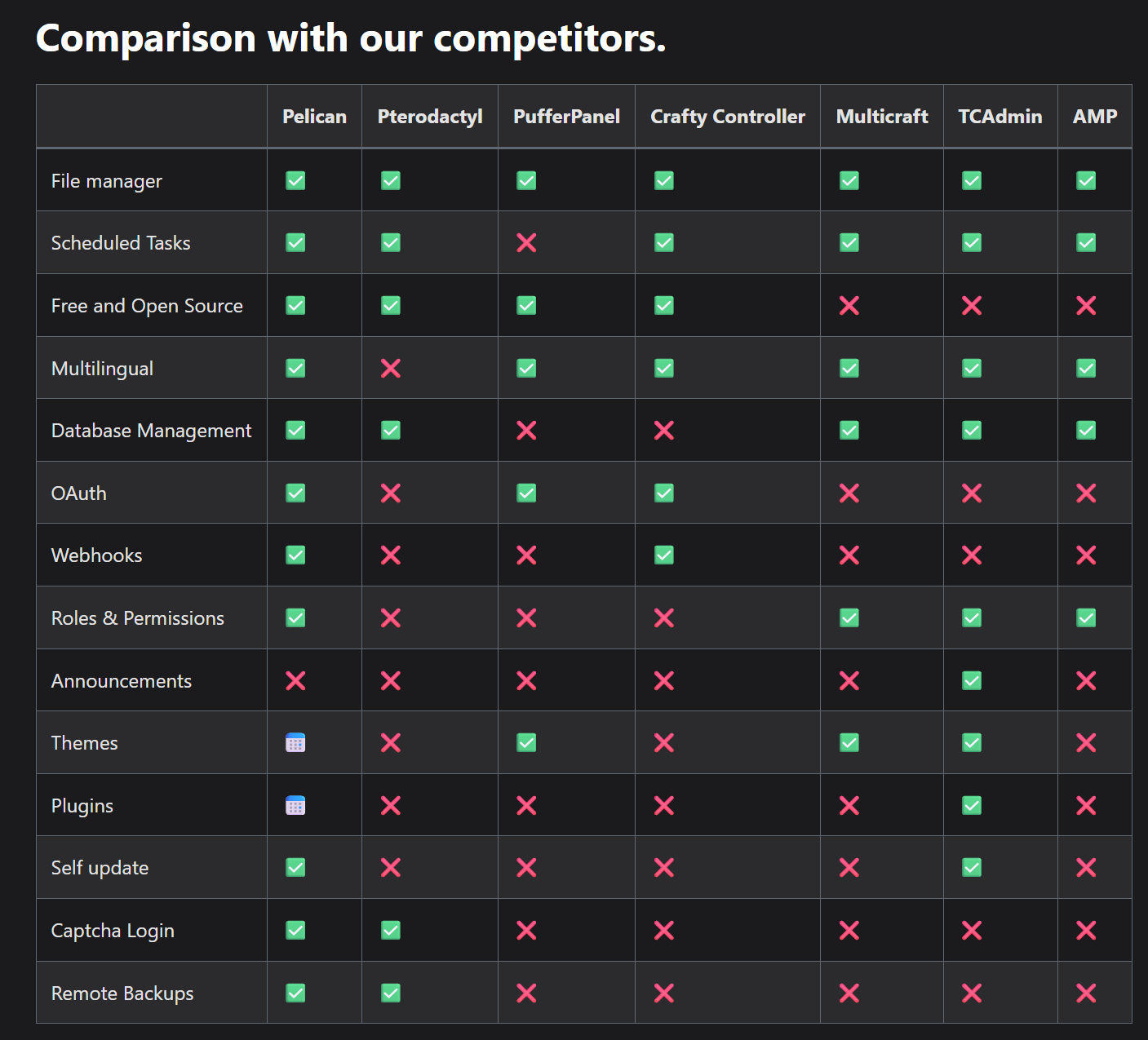We attempted to package this but failed. (First packaging attempt)
If somebody else wants to try, this is what we learned:
# Lessons from Attempting to Package Pelican Panel for Cloudron
## Key Lessons Learned
Here are the top 5 things that caused the most trouble:
- **Health Check Stalls**: Pelican's slow startup (e.g., DB migrations, asset compilation) often times out Cloudron's health checks. Extend the Dockerfile's `HEALTHCHECK --start-period` to 120s+ for real use, or use a temporary dummy (e.g., `CMD true`) to bypass for debugging—revert it later to avoid false "healthy" states.
- **Env Var Management**: Cloudron rejects an "environment" array in the manifest (validation error: "Unknown property"). Hardcode defaults in Dockerfile `ENV` lines, then manually edit `/app/data/.env` via SSH post-install to inject Cloudron placeholders like `${MYSQL_HOST}` (get them from `cloudron inspect --app <fqdn>`).
- **Manifest Validation Issues**: Cloudron is strict—unsupported fields fail installs outright. Stick to the official schema (check [Cloudron docs](https://cloudron.io/documentation/custom-apps/manifest/)), test with JSON validators, and remove extras like custom env sections.
- **Git Merge Conflicts**: Editing files locally vs. directly on GitHub leads to push rejections. Always run `git pull origin main` before changes, and resolve conflicts by manually editing/removing markers (e.g., `<<<<<<< HEAD`, `=======`, `>>>>>>>`).
- **Image Registry Choices**: GHCR (GitHub Container Registry) can have pull/auth issues in Cloudron; Docker Hub is more reliable for public images. Ensure the manifest's "dockerImage" matches your pushed tag, and verify pulls locally before installing.
## Useful Code Snippets
These are anonymized examples that helped during troubleshooting. Adapt them to your setup.
### Basic CloudronManifest.json (Validated, No Invalid Fields)
```json
{
"id": "dev.pelican.panel",
"title": "Pelican Panel",
"version": "1.0.0-beta22",
"description": "Open-source game server management panel",
"tagline": "Manage your game servers with Pelican",
"website": "https://pelican.dev",
"icon": "logo.png",
"healthCheckPath": "/",
"httpPort": 80,
"manifestVersion": 2,
"dockerImage": "yourusername/pelican-panel:latest",
"addons": {
"localstorage": {},
"mysql": {},
"sendmail": {}
},
"postInstallMessage": "After installation, please visit https://${DOMAIN}/installer to complete the setup."
}
Dockerfile Snippets (Key Sections for Env, Health Check, and Storage)
# Default ENV vars (add after FROM php:8.2-fpm-alpine)
ENV APP_ENV=production
ENV APP_DEBUG=false
ENV APP_URL=https://${APP_DOMAIN}
ENV APP_KEY=base64:your-generated-key-here # Generate with: docker run -it php:8.2-fpm-alpine php -r "echo 'base64:' . base64_encode(random_bytes(32));"
ENV DB_CONNECTION=mysql
ENV DB_HOST=127.0.0.1
ENV DB_PORT=3306
ENV DB_DATABASE=pelican
ENV DB_USERNAME=root
ENV DB_PASSWORD=secret
ENV MAIL_DRIVER=sendmail
ENV MAIL_FROM_ADDRESS=admin@${APP_DOMAIN}
ENV MAIL_FROM_NAME="Pelican Panel"
# Production HEALTHCHECK (extend start-period for slow startups)
HEALTHCHECK --interval=30s --timeout=10s --start-period=120s --retries=3 \
CMD curl -f http://localhost/ || exit 1
# Dummy HEALTHCHECK (debug only - auto-passes)
# HEALTHCHECK --interval=5s --timeout=3s --start-period=10s --retries=3 \
# CMD true || exit 0
# Storage symlinks for Cloudron persistence (add in RUN)
RUN ln -s /app/data/.env /var/www/html/.env && \
ln -s /app/data/storage /var/www/html/storage && \
chown -R www-data:www-data /var/www/html /app/data
Post-Install SSH Commands for Fixes
# SSH to server, then:
cloudron logs --app your-app-fqdn # Check high-level logs
docker ps | grep pelican # Get container ID
docker logs <container-id> # Detailed app logs
docker exec -it <container-id> /bin/sh # Enter container
# Inside: apk add nano; nano /app/data/.env # Edit env vars
# Then: php artisan migrate --force; supervisorctl restart all
# Exit and: cloudron restart --app your-app-fqdn
Final Notes
Testing Tip: Run the image locally (docker run -p 80:80 yourimage) before Cloudron to verify health checks and env vars.
Why It's Tricky: Pelican (Laravel-based) needs precise env setup and can be slow to boot—manual SSH tweaks were essential.
Sharing: If you build on this, post updates here or on Pelican's GitHub.
 3
2 Votes2 Posts1k Views
3
2 Votes2 Posts1k Views